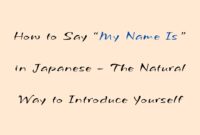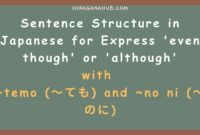I Understand (- ga + wakarimasu): Easy Guide to Learning Japanese
Sentence Patterns
Learning Japanese can be very enjoyable if we understand its basic sentence
patterns. One commonly used pattern is “- ga + wakarimasu” to
express understanding or comprehension of something. In this article, we will
delve into this sentence pattern, including its positive and negative forms,
along with examples in daily conversations.
Basic Sentence Pattern
The basic sentence pattern to express that someone understands something is:
Noun 1 + は (wa) + Noun 2 + が (ga) + わかりま (wakarimasu)
This means “Noun 1” understands or comprehends “Noun 2.” If the word
yoku is added before wakarimasu, it means
“understand very well.”

Example:
-
あみさんは英語がわかります
Amisan wa eigo ga wakarimasu: Ami San understands English. -
まいさんはカンジがぜんぜんわかりません
Mai-san wa kanji ga zenzen wakarimasen: Mai does not
understand kanji at all.
Negative Form
To express not understanding something, we use:
Noun 1 + wa + Noun 2 + ga + wakarimasen
If amari is added before wakarimasen, it
means “understand a little.” Meanwhile, if zenzen is used
before wakarimasen, it means “do not understand at all.”
Example:
-
たろうさんは日本語があまりわかりません
Tarou-san wa nihongo ga amari wakarimasen: Tarou understands
Japanese a little. -
りんさんはおんがくがよくわかります
Rin-san wa ongaku ga yoku wakarimasu: Rin understands music
very well.
Daily Conversations
Here are some simple daily conversation examples using this sentence pattern:
Conversation 1
-
たろう: りんさんは日本語がわかりますか?
Tarou: Rin-san wa nihongo ga wakarimasu ka?: Does Rin
understand Japanese? -
りん: はい,よくわかります。
Rin: Hai, yoku wakarimasu: Yes, I understand very well.
Conversation 2
-
あみさんはえいごがわかりません
Ami-san wa eigo ga wakarimasen: Ami does not understand
English. -
そうですか? じゃ、わたしのにほんごがわかりますか?
Sō desu ka? Ja, watashi no nihongo ga wakarimasu ka?:
Really? Then, do you understand my Japanese? -
はい,よくわかります。
Hai, yoku wakarimasu.: Yes, I understand very well.
Conversation 3
-
まいさんはかんじがぜんぜんわかりません
Mai-san wa kanji ga zenzen wakarimasen: Mai-san does not
understand kanji at all. -
どうしてですか? どりょうがつかないんですか?
Dōshite desu ka? Doryōgaku tsukanain desu ka?: Why? Is
there no learning method? -
はい,どりょうがありません。したがっているんです。
Hai, doryō ga arimasen. Shitagatte irundesu.: Yes, there
is none, so that is the case.
Vocabulary Used
| Kanji | Hiragana | Romaji | Meaning |
|---|---|---|---|
| 日本語 | にほんご | nihongo | Japanese language |
| 英語 | えいご | eigo | English language |
| カンジ | かんじ | kanji | Kanji |
| おんがく | おんがく | ongaku | Music |
| よく | よく | yoku | Very well |
| ぜんぜん | ぜんぜん | zenzen | Not at all |
| あまり | あまり | amari | A little |
| わかります | わかります | wakarimasu | Understand/comprehend |
| わかりません | わかりません | wakarimasen | Do not understand |
The sentence pattern “- ga + wakarimasu” is one of the most
commonly used patterns in Japanese daily conversations. By understanding this
pattern, you can feel more confident when speaking or listening to Japanese.
Don’t forget to keep practicing through conversations or joining online
learning communities. Keep up the spirit of learning Japanese!


